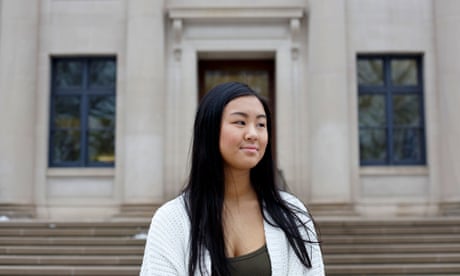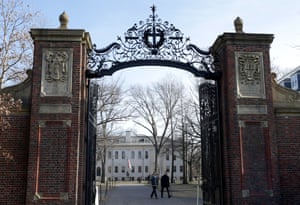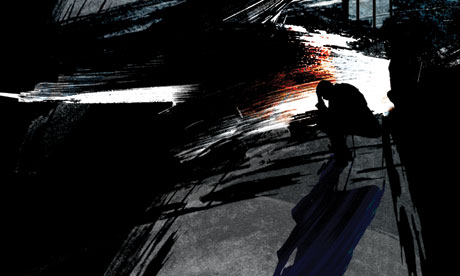‘Elite colleges are serving to reinforce class inequality, rather than reduce it.’ Photograph: Boston Globe/Boston Globe via Getty Images
Shock horror! Wealthy Americans are using their money to buy their children places at elite colleges. An FBI investigation, appropriately named Operation Varsity Blues, has exposed a $25m cash-for-admissions scandal. Coaches were allegedly bribed to declare candidates as athletic recruits; test administrators to change their scores, or allow someone else to take the test for them.
At the center of the cheating scheme was William “Rick” Singer, the founder of a for-profit college preparation business based in Newport Beach, California. Among the 33 parents caught in the FBI sting were Hollywood stars Lori Loughlin and Felicity Huffman. Loughlin starred in the series Full House. Huffman is famous for her role in Desperate Housewives; now she will be more famous as a desperate mom. And she’s not alone. The breathless anxiety among many affluent parents to get their kids into the very best colleges is a striking feature of upper-class American life.
Singer’s bribery scheme allegedly allowed parents to buy entrance for their offspring at some of the nation’s most prestigious colleges, including Yale, Georgetown University, Stanford University, UCLA, the University of San Diego, USC, University of Texas and Wake Forest.
FBI officers were at pains to point out that the colleges themselves are not being found liable; though nine athletic coaches were caught in the net.
“Following 10 months of investigation using sophisticated techniques, the FBI uncovered what we believe to be a rigged system,” John Bonavolonta, the FBI special agent in charge said, “robbing students all over the country of their right to a fair shot of getting into some of the most elite universities in this country”.
But here’s the thing: the whole system is “rigged” in favor of more affluent parents. It is true that the conversion of wealth into a desirable college seat was especially egregious in this case – to the extent that it was actually illegal. But there are countless ways that students are robbed of a “fair shot” if they are not lucky enough to be born to well-resourced, well-connected parents.
The difference between this illegal scheme and the legal ways in which money buys access is one of degree, not of kind. The mistake here was to do something illegal. Meanwhile, much of what goes on in college admissions many not be illegal, but it is immoral.
Take legacy preferences, for example. This boosts the admissions chances of the children of alumni; and for obvious reasons the alumni of elite colleges tend to be pretty affluent, especially if they marry each other. (They are also disproportionately white.) The acceptance rate for legacy applicants at Harvard, Yale, Princeton, Georgetown and Stanford is between two and three times higher than the general admission rate. If they don’t get in first time round, they might be asked to take a “gap year” and enter a year later instead, a loophole known as “Z-listing”. A Princeton study found that being a legacy applicant had the same effect as adding 160 SAT points – on the old scale up to 1600 – to a student’s application. Imagine if colleges gave that kind of admissions boost to lower-income kids?
As John W Anderson, the former co-director of college counseling at the Phillips Academy, an elite boarding school in Andover, Massachusetts, once admitted, of the students from his school who are Z-listed for Harvard, “a very, very, very high percent” are legacies. The Harvard Crimson estimates the proportion at around one in two.
Or how about donor preferences? Rather than bribing coaches, the wealthiest parents can just bribe – sorry, donate to – the college directly. In 2017, the Washington Post reported on the special treatment given to “VIP applicants” via an annual “watch list”. Applicants whose parents were big donors would have notes on their files reading “$500k. Must be on WL” (wait list). Even better, these donations are tax free!
As a general rule, the bigger the money the bigger the effect on admissions chances. Among elite aspirational alums, the question asked is “what’s the price?”. In other words, how much do you have to donate to get your child in?
Whatever the price is, those with the fattest wallets can obviously pay it. Peter Malkin graduated from Harvard Law School in 1958. He became a very wealthy real estate businessman, and huge donor. In 1985, the university’s indoor athletic facility was renamed the Malkin Athletic Center in his honor. All three of Malkin’s children went to Harvard. By 2009, five of his six college-age grandchildren had followed suit. (One brave boy dared to go to Stanford instead.)
Shock horror! Wealthy Americans are using their money to buy their children places at elite colleges. An FBI investigation, appropriately named Operation Varsity Blues, has exposed a $25m cash-for-admissions scandal. Coaches were allegedly bribed to declare candidates as athletic recruits; test administrators to change their scores, or allow someone else to take the test for them.
At the center of the cheating scheme was William “Rick” Singer, the founder of a for-profit college preparation business based in Newport Beach, California. Among the 33 parents caught in the FBI sting were Hollywood stars Lori Loughlin and Felicity Huffman. Loughlin starred in the series Full House. Huffman is famous for her role in Desperate Housewives; now she will be more famous as a desperate mom. And she’s not alone. The breathless anxiety among many affluent parents to get their kids into the very best colleges is a striking feature of upper-class American life.
Singer’s bribery scheme allegedly allowed parents to buy entrance for their offspring at some of the nation’s most prestigious colleges, including Yale, Georgetown University, Stanford University, UCLA, the University of San Diego, USC, University of Texas and Wake Forest.
FBI officers were at pains to point out that the colleges themselves are not being found liable; though nine athletic coaches were caught in the net.
“Following 10 months of investigation using sophisticated techniques, the FBI uncovered what we believe to be a rigged system,” John Bonavolonta, the FBI special agent in charge said, “robbing students all over the country of their right to a fair shot of getting into some of the most elite universities in this country”.
But here’s the thing: the whole system is “rigged” in favor of more affluent parents. It is true that the conversion of wealth into a desirable college seat was especially egregious in this case – to the extent that it was actually illegal. But there are countless ways that students are robbed of a “fair shot” if they are not lucky enough to be born to well-resourced, well-connected parents.
The difference between this illegal scheme and the legal ways in which money buys access is one of degree, not of kind. The mistake here was to do something illegal. Meanwhile, much of what goes on in college admissions many not be illegal, but it is immoral.
Take legacy preferences, for example. This boosts the admissions chances of the children of alumni; and for obvious reasons the alumni of elite colleges tend to be pretty affluent, especially if they marry each other. (They are also disproportionately white.) The acceptance rate for legacy applicants at Harvard, Yale, Princeton, Georgetown and Stanford is between two and three times higher than the general admission rate. If they don’t get in first time round, they might be asked to take a “gap year” and enter a year later instead, a loophole known as “Z-listing”. A Princeton study found that being a legacy applicant had the same effect as adding 160 SAT points – on the old scale up to 1600 – to a student’s application. Imagine if colleges gave that kind of admissions boost to lower-income kids?
As John W Anderson, the former co-director of college counseling at the Phillips Academy, an elite boarding school in Andover, Massachusetts, once admitted, of the students from his school who are Z-listed for Harvard, “a very, very, very high percent” are legacies. The Harvard Crimson estimates the proportion at around one in two.
Or how about donor preferences? Rather than bribing coaches, the wealthiest parents can just bribe – sorry, donate to – the college directly. In 2017, the Washington Post reported on the special treatment given to “VIP applicants” via an annual “watch list”. Applicants whose parents were big donors would have notes on their files reading “$500k. Must be on WL” (wait list). Even better, these donations are tax free!
As a general rule, the bigger the money the bigger the effect on admissions chances. Among elite aspirational alums, the question asked is “what’s the price?”. In other words, how much do you have to donate to get your child in?
Whatever the price is, those with the fattest wallets can obviously pay it. Peter Malkin graduated from Harvard Law School in 1958. He became a very wealthy real estate businessman, and huge donor. In 1985, the university’s indoor athletic facility was renamed the Malkin Athletic Center in his honor. All three of Malkin’s children went to Harvard. By 2009, five of his six college-age grandchildren had followed suit. (One brave boy dared to go to Stanford instead.)

How elite US schools give preference to wealthy and white 'legacy' applicants
Or how about Jared Kushner, Donald Trump’s son-in-law? Kushner was accepted into Harvard shortly after his father donated $2.5m. An official at Kushner’s high school said there was “no way anybody in the administrative office of the school thought he would, on the merits, get into Harvard. His GPA did not warrant it, his SAT scores did not warrant it.”
David E and Stacey Goel just gave $100m to Harvard. I’m going to go out on a limb here and say that their children probably have an excellent chance of Harvard admission.
Even those parents who are not in the wealthiest brackets, but are squarely in the upper middle class, can use their money to boost their kids’ chances, through tutors, SAT prep classes, athletic coaches. Students who apply early have better chances of admission, which favors more affluent families since early admission precedes financial aid decisions. Many colleges prefer students who have “shown an interest” in their college. How to show an interest? By visiting the campus – easy for those with money for flights and hotels, less so for those on modest or low incomes.
Small wonder that at elite colleges, including most of those targeted in the corruption scheme such as Yale, Duke, Stanford and Wake Forest, take more students from families in the top 1% of the income distribution than from those in the bottom 60% combined.
So hats off to FBI special agent Bonavolonta and his team for exposing the corruption admissions. But it is in fact simply the most visible sign of a much deeper problem with college admissions. Elite colleges are serving to reinforce class inequality, rather than reduce it. The opaque, complex, unfair admissions process is a big part of the problem. From an equality perspective, it is not just Singer and his clients who are at fault: it’s the system as a whole.



